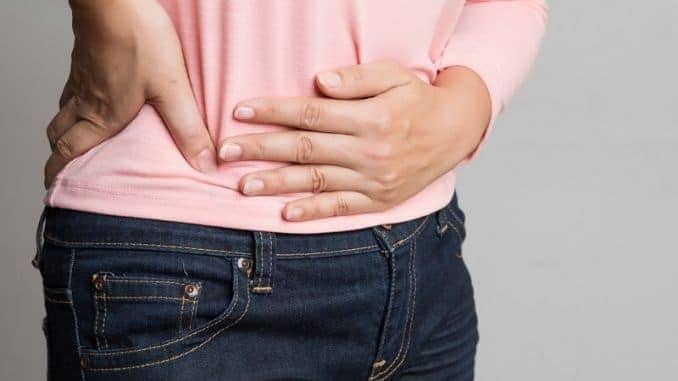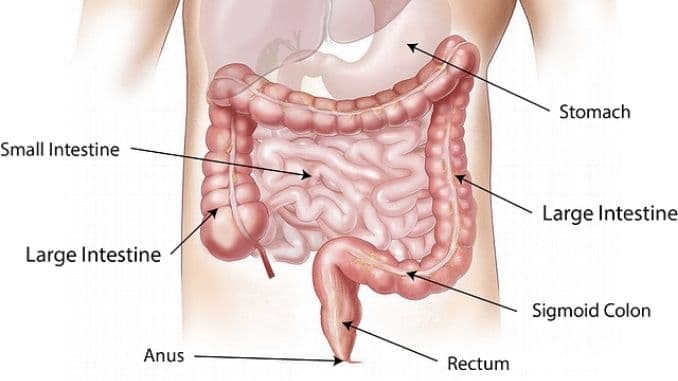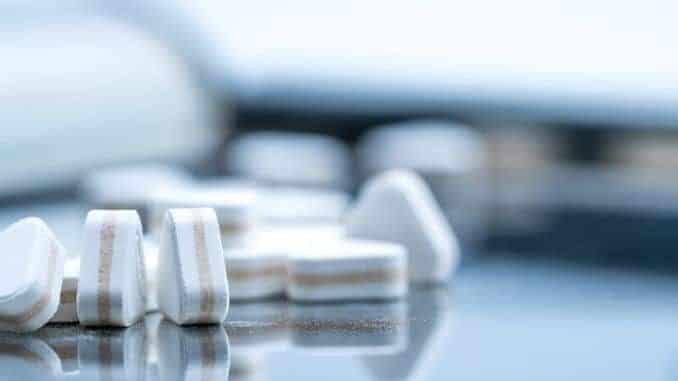
You’re hungry, but you know what’s going to happen.
You’ll eat. You’ll enjoy the meal. Then, a few minutes later, your stomach will blow up like a balloon.
It’s uncomfortable, irritating and frustrating, and it sure doesn’t help when you’re trying to look your best in that killer new black dress.
Why is this happening?
We all experience bloating now and then, but if it’s affecting you after nearly every meal, read on.
What Is Bloating?
Bloating occurs when there is a change in the volume of contents in the abdomen. We often think it’s all gas, but there are often other factors at work too:
- Too much in there: The contents of the intestines increase because of constipation (too much stool), excess gas or excess liquid (diarrhea). This causes the abdomen to expand, pressure in the abdomen to increase and the diaphragm to be pushed up higher into the chest.
- Slow emptying: For a variety of reasons, the stomach and intestines aren’t moving things along quickly enough. Indigestion (dyspepsia), slow gas transport associated with irritable bowel syndrome (IBS) or constipation can all slow emptying, resulting in that distended feeling.
- Sensitivity: Common in those with IBS, hypersensitivity in the gut causes ordinary small changes in volume to feel like bloating. With this type, the belly does not stick out, but it still feels tight and full.
- Fluid accumulation: Conditions like congestive heart failure and kidney disease can cause fluid accumulation in the abdomen ― and usually in the legs too ― causing bloating and distension.
Whatever may be causing it, bloating is uncomfortable. Your belly starts to feel full, tight and swollen. You may also experience minor stomach cramps, flatulence and burping or belching.
If bloating happens only occasionally, it’s not that big a deal, but for many people, it becomes a frequent problem. The University of North Carolina Center for Functional GI & Motility Disorders notes that bloating affects 10 to 30 percent of people and is related to increases in sick days, physician visits and medication use. Of those reporting the problem in a United States survey, about three quarters stated it was moderate to severe.
What Causes Bloating?
There are a number of different things that can cause bloating. Medical conditions like IBS; inflammatory bowel diseases (IBDs) like ulcerative colitis or Crohn’s disease; celiac disease; kidney failure; congestive heart failure; pancreatic insufficiency; intestinal infections; eating disorders; lactose intolerance and some medications can all increase risk.
There are other less serious conditions, however, that can lead to bloating too. Here are some of the most common and their accompanying solutions:
- Stress and anxiety (particularly while eating): Practice calming activities like meditation, regular exercise and journaling, and make a point to slow down and relax during your meals.
- Eating too quickly: Chew your food slowly and enjoy the flavors.
- Overeating: Stop eating before you’re completely full. The brain takes up to 20 minutes to register that your stomach has had enough, so give it time to do so. Also, consider eating smaller meals in general — using smaller plates can help.
- Eating rich or fatty foods: Avoid fatty meats, French fries, fast food and other items that are likely to punish your stomach.
- Food sensitivities or intolerances: Check with your allergy doctor. He or she can conduct a test to help you determine what foods you may be sensitive to.
- Hormonal changes (such as those that occur during the menstrual cycle or menopause): If you experience bloating during your period or after menopause, try using some of the solutions listed below.
- Unbalanced microbiome in the gut: If you’ve taken a regimen of antibiotics lately, it could be that the balance of good to bad bacteria in your gut is out of whack. Try eating more foods rich in probiotics, including yogurt, kefir, miso, kombucha and other fermented items.
- Constipation: If you’re struggling with constipation, talk to your doctor about solutions. Consider taking a fiber supplement like Metamucil, but if you’re still struggling after a couple of weeks, it may be that your stomach is too sensitive to the extra fiber.
According to a 2012 study, bloating is particularly common in people with IBS and constipation.
Bloating Increases With Age
If you’ve never had a problem with bloating before, but suddenly find that you’re dreading your next meal. If you’re age 40 or older, it could be that age is slowing your stomach down.
Normally, when we eat, the stomach releases more acid to help digest those foods. As we age, however, the process tends to become less efficient, and that can make bloating a more common occurrence. We may have less stomach acid available, so we’re not able to break down foods as well, and they pass from the stomach into the intestine “undigested,” causing bloating.
The digestive system as a whole may also slow down, failing to push things along as well as it did when you were younger. The stomach may become more sensitive to certain foods or fiber, making digestion more difficult.
Menopause and perimenopause are common triggers for bloating too. As the hormones fluctuate, estrogen may increase at times, which causes the body to retain water. That water retention equals bloat. When estrogen levels plummet again, that decreases levels of bile, which traditionally keep the intestines lubricated. Less lubrication means harder and drier stools, which can lead to constipation. This, in turn, leads to bloating.
Watch What You Eat
If you’re not sure what’s causing your bloating, the first place to look is your diet. There are some foods that are known to cause bloating. If they’re not properly digested in the stomach, they move on into the intestines, where bacteria break them down and produce gas.
Start by avoiding these for a couple of weeks to see how you feel:
- Carbonated beverages
- Artificial sweeteners
- Broccoli and other cruciferous vegetables
- Beans and lentils
- Onions
- Sugar alcohols (xylitol, sorbitol, and mannitol)
- Beer
Some people are also sensitive to certain types of carbohydrates called “FODMAPs (fermentable oligo-, di-, mono-saccharides and polyols).” These are short-chain carbohydrates that are resistant to digestion and tend to survive until far into the intestines. Once there, gut bacteria break them down, causing gas. They can also draw fluid into the intestine, causing diarrhea.
The only way to tell if you may be sensitive to these foods is to watch how you feel after you eat them. If they bother you, try avoiding them for a couple of weeks to see if that helps. Common FODMAPs include:
- Fruits: Apples, apricots, blackberries, cherries, dates, figs, pears, peaches and watermelon
- Vegetables: Artichokes, asparagus, broccoli, Brussels sprouts, cabbage, cauliflower, garlic, leeks, mushrooms, onions, and peas
- Legumes: Beans, chickpeas, red kidney beans, and baked beans
- Grains: Wheat, barley, and rye
- Dairy products: For those sensitive to lactose
- Sweeteners: Fructose, honey, high fructose corn syrup, xylitol, mannitol, and sorbitol
- Beverages: Beer, fortified wines, carbonated beverages, and fruit juices
You may be sensitive to some of these, but not others. Try keeping a food diary for a couple of weeks, in which you list what you eat and how you feel afterward. Then, try eliminating foods that may be causing your bloating one by one.
5 Natural Solutions for Bloating
In addition to adjusting your diet as needed, you can also try one or more of these natural solutions for bloating.
1. Drink Tea
Ginger, peppermint and fennel teas are known to help with digestion. Ginger helps improve digestive function and prevent heartburn and can help break down. It relaxes the intestine and eases abdominal cramps while speeding digestion to improve stomach emptying. Try drinking it before or during a meal.
Peppermint also has relaxing properties, relieving cramps and spasms in the gut and can help improve the flow of food through the digestive tract. Try a cup 15 minutes before eating.
Fennel seeds have gas-reducing oils and can be particularly helpful when eating cruciferous vegetables and other foods that are known to cause gas and bloating. You can chew on fennel seeds after a meal or try crushing them and steeping them in boiled water to make fennel tea.
2. If You’re Constipated, Get More Probiotics
Probiotics feed the good bacteria in the gut and help improve balance in the microbiome. Although their main claim to fame is that they help improve gut health following antibiotic use, they may also help with constipation.
A review of 14 clinical trials, for example, found that certain strains of probiotics — mainly Bifidobacterium lactis — helped improve gut transit time, stool frequency and stool consistency.
If you think IBS is causing your bloating, probiotics may help you. In a 2011 study, researchers found that more than half of IBS patients who took probiotic supplements experienced improvements in pain, cramps and bloating.
It’s best to get your probiotics from foods like yogurt, miso, kombucha, kefir, and other fermented foods, but if you’ve had antibiotics recently, probiotic supplements may be helpful. Do watch how you feel when taking them, however. A small study published in 2018 found a link between taking probiotics and bloating and confusion. If you notice these symptoms, discontinue the probiotics.
3. Take Digestive Enzymes
We all have enzymes in our bodies that naturally help break down foods during the digestion process. These enzymes need stomach acid to become activated, however. If you have reduced stomach acid because of age, your enzymes may not be working as well as they used to.
The mouth, stomach, and small intestine all make their own digestive enzymes, but the pancreas is the main enzyme-producing organ. When you eat a meal, the pancreas floods the small intestine with a variety of enzymes to help break down foods. These include:
-
- Lipase, which helps break down fats
- Amylase, which breaks down carbohydrates
- Proteases and peptidases, which break down proteins
When the process works as it should, digestion progresses smoothly. If you don’t have enough of your own enzymes, however, digestion slows, and you may experience bloating. That’s when enzyme supplements may be helpful.
If you have trouble with dairy products, for example, a lactase supplement (like Lactaid or Lactrase) can help. If you have a hard time digesting beans, an alpha-galactosidase supplement (like Beano or Bean Relief) can prevent bloating. Other combination enzyme products taken with meals can help reduce bloating and gas.
4. Consider Increasing Fiber
Particularly if constipation is causing your bloating, getting more fiber may help. Be sure to watch how you feel because, in some people, fiber only makes the situation worse.
Most people don’t get enough fiber in their daily diets. The recommendation is 25 grams a day for women and 38 grams a day for men. If you think this may be an issue for you, try increasing your fiber intake gradually.
Start with your diet. Get more oatmeal, flaxseed, fruits and vegetables, seeds, nuts, and bran. Then, talk to your doctor about psyllium (Metamucil), which contains 70 percent soluble fiber. Research shows that not only can it help relieve and prevent constipation, it can also ease the symptoms of IBS.
Another option is methylcellulose (found in Citrucel). If you find you’re still feeling bloated on psyllium, this may be a better option for you, as it’s less likely to contribute to bloating and gas.
5. Try Herbs and Spices
Several herbs and spices are known to help with bloating. Below are a few of them:
-
- Artichoke leaf extract: If you suffer from IBS, this may be a good solution for you. Studies show that it helps stimulate the release of bile from the gallbladder, which can be particularly helpful after a fatty meal or after overeating.
- Turmeric: Curcumin, which is the active ingredient in turmeric, has been found in studies to help improve abdominal pain, bloating and pressure. Try using the spice more often in your cooking or consider a supplement.
- Caraway: Try chewing on a pinch of caraway to relieve symptoms of bloating or use it to make a tea and sip during meals. It helps prevent gas and aid in its release.
- Chamomile: Like artichoke leaf extract, chamomile helps release bile, allowing the digestive system to work more efficiently. Drink chamomile tea during or after a meal.
- Coriander: These seeds help accelerate the digestion process and reduce indigestion. You can use them more often in your recipes or make a tea with them.
For your guide to improving your digestive health, check out our 14-Day Digestive Health Quick Start Program, here!







